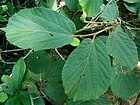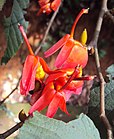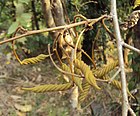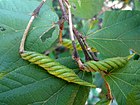Note: This is a project under development. The articles on this wiki are just being initiated and broadly incomplete. You can Help creating new pages.
Helicteres isora - Avartani
Avartani is a shrub or small tree. It can grow up to 8 metres tall. It is gathered from the wild and used locally as a medicine, the plant has also been experimentally cultivated as a fibre plant in India.
Contents
- 1 Uses
- 2 Parts Used
- 3 Chemical Composition
- 4 Common names
- 5 Properties
- 6 Habit
- 7 Identification
- 8 List of Ayurvedic medicine in which the herb is used
- 9 Where to get the saplings
- 10 Mode of Propagation
- 11 How to plant/cultivate
- 12 Commonly seen growing in areas
- 13 Photo Gallery
- 14 References
- 15 External Links
Uses
Diarrhea, Dysentery, Intestinal parasites, Scabies, Biliousness.[1]
Parts Used
Chemical Composition
It contains three new compounds Glucopyranosyl rosmarinic acid and Lactic acid named as 4'-O-β-D-glucopyranosyl isorinic acid etc.[3]
Common names
| Language | Common name |
|---|---|
| Kannada | ಭೂತಕರುಳು Bhutakarulu, ಚುಚುಲು Chuchulu |
| Hindi | Marodphali, Marorphali |
| Malayalam | Ishvaramuli, Itampirivalampiri |
| Tamil | Edampuri, Pirimurukku, Valampurikai |
| Telugu | Aadasamanthi, Adivichamanthi |
| Marathi | NA |
| Gujarathi | NA |
| Punjabi | Maror phali |
| Kashmiri | NA |
| Sanskrit | Avartani, Mrgasrngi |
| English | Indian screw tree |
. [4]
Properties
Reference: Dravya - Substance, Rasa - Taste, Guna - Qualities, Veerya - Potency, Vipaka - Post-digesion effect, Karma - Pharmacological activity, Prabhava - Therepeutics.
Dravya
Rasa
Kashaya (Astringent)
Guna
Laghu (Light), Rooksha (Dry)
Veerya
Sheeta (cold)
Vipaka
Karma
Pitta, Kapha
Prabhava
Habit
Identification
Leaf
| Kind | Shape | Feature |
|---|---|---|
| Simple | Alternate | 5-12 x 3-8 cm, obovate to suborbicular, apex acute or acuminate, base cordate, margin irregularly crenate- serrate; 3-5-nerved at the base. |
Flower
| Type | Size | Color and composition | Stamen | More information |
|---|---|---|---|---|
| Bisexual | Axillary, solitary or in few-flowered cymes | Red | 10 | Bracts 2-3 mm long, linear, 2 brown glands present in the axil of bracts. Flowering season is July-December |
Fruit
| Type | Size | Mass | Appearance | Seeds | More information |
|---|---|---|---|---|---|
| Follicles | 4-6 cm long | Spirally twisted, stellate-tomentose, beaked | Seeds 2-3 mm long, angular, black, wrinkled | Fruiting season is September to November |
Other features
List of Ayurvedic medicine in which the herb is used
Where to get the saplings
Mode of Propagation
How to plant/cultivate
Helicteres isora is easily propagated by seed, but vegetative propagation with stem cuttings is also possible.[6]
Commonly seen growing in areas
Photo Gallery
References
- ↑ Uses
- ↑ ”Karnataka Medicinal Plants Volume - 2” by Dr.M. R. Gurudeva, Page No.103, Published by Divyachandra Prakashana, #45, Paapannana Tota, 1st Main road, Basaveshwara Nagara, Bengaluru.
- ↑ Joural paper of Chemical and Pharmaceutical bulletin.
- ↑ Vernacular names
- ↑ BOTANICAL DESCRIPTION
- ↑ Cultivation details
External Links
- Ayurvedic Herbs known to be helpful to treat Diarrhea
- Ayurvedic Herbs known to be helpful to treat Dysentery
- Ayurvedic Herbs known to be helpful to treat Intestinal parasites
- Ayurvedic Herbs known to be helpful to treat Scabies
- Ayurvedic Herbs known to be helpful to treat Biliousness
- Herbs with Bark used in medicine
- Herbs with Root used in medicine
- Herbs with Leaf used in medicine
- Herbs with common name in Kannada
- Herbs with common name in Hindi
- Herbs with common name in Malayalam
- Herbs with common name in Tamil
- Herbs with common name in Telugu
- Herbs with common name in Punjabi
- Herbs with common name in Sanskrit
- Herbs with common name in English
- Habit - Shrub
- Index of Plants which can be propagated by Seeds
- Index of Plants which can be propagated by Cuttings
- Herbs that are commonly seen in the region of Tropical area
- Herbs
- Shrub
- Ayurvedic herbs that don't have seed photos
- Malvaceae





